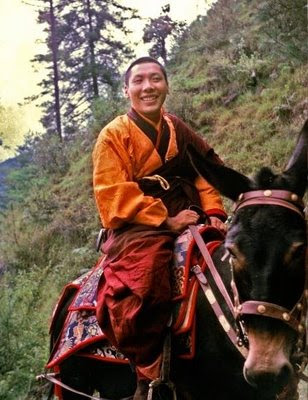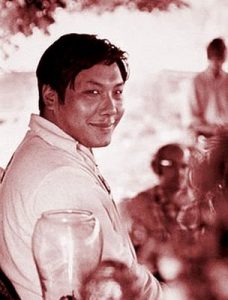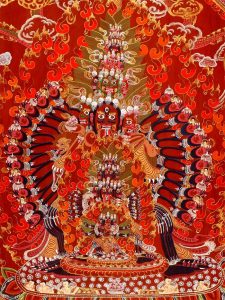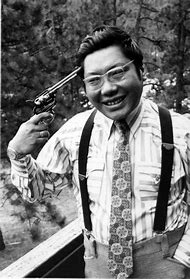
The Dalai Lama once said that he thought Buddhism was so alive in America and Europe because Westerners carried no Buddhist baggage with them. There were no centuries of priestly hierarchies, no tedious tomes of verse to memorize, no tradition-bound rules and regulations. Regardless of the Dalai Lama’s hopeful analysis, Western Buddhists sometimes replaced oppressive traditions with confused expectations.
...too complicated to categorize
 Rinpoche Chogyam Trungpa, — eleventh Trungpa, supreme abbot of the Surmang monasteries, scholar, teacher, poet, artist — practiced holy-tantric womanizing and devoted drinking among his varied rebellions against traditional Tibetan Buddhism. He appeared to many as a perfect teacher for the potentially holier-than-thou aspiring Buddhists of 1970s America. In his own words, Trungpa believed his mission was to shake up traditional Buddhism and merge it with everyday life. “When we talk about compassion,” he said, “we assume that means being kind. But it can also require being creative to wake a person up.” And wake them up he did.
Rinpoche Chogyam Trungpa, — eleventh Trungpa, supreme abbot of the Surmang monasteries, scholar, teacher, poet, artist — practiced holy-tantric womanizing and devoted drinking among his varied rebellions against traditional Tibetan Buddhism. He appeared to many as a perfect teacher for the potentially holier-than-thou aspiring Buddhists of 1970s America. In his own words, Trungpa believed his mission was to shake up traditional Buddhism and merge it with everyday life. “When we talk about compassion,” he said, “we assume that means being kind. But it can also require being creative to wake a person up.” And wake them up he did.
On one occasion, when Trungpa was scheduled to speak in San Francisco, a crowd of Buddhist neophytes sat out-lotusing one another in a pristine, hardwood-floored and brick-walled meditation space. Sitting in perfect columns and rows, dressed in immaculate gauze and cotton clothing, long hair straight, clean, and shining, they meditated while waiting for the arrival of the master.
 At the front of the room sat an ancient Tibetan throne, lent by a wealthy collector of Asian art. The great chair was ornately carved, a massive masterpiece. It was draped in fine Tibetan silks that danced with exotic colors and glistened under the low lights. On the floor, an elegant Tibetan carpet flowed down the stairs of the dais to lead the Attendant of the Dharma Ocean to his appointed place, elevated above, and at the head of the crowd of humble students.
At the front of the room sat an ancient Tibetan throne, lent by a wealthy collector of Asian art. The great chair was ornately carved, a massive masterpiece. It was draped in fine Tibetan silks that danced with exotic colors and glistened under the low lights. On the floor, an elegant Tibetan carpet flowed down the stairs of the dais to lead the Attendant of the Dharma Ocean to his appointed place, elevated above, and at the head of the crowd of humble students.
The hour came… and passed. The devotees meditated, occasionally raising an ommmmmmm between them, sharing its collective energy and giving to it in return. Slowly, silence occupied the space, broken only by a car horn or sirens from a nearby fire station. Perfect lotus positions began to collapse. Buttocks shifted on the hardwood floor. Acolytes at the front of the room squirmed uncomfortably beneath the imposing tower of the great, bedecked throne.
In the silence, a faint scuffling rose up the stairwell at the back of the hall. The polished wooden steps gave off a creak, followed by a metallic clicking and a muffled giggle. The meditators maintained their positions. The clicks ascended the stairs and feet shuffled behind the curtains. A few heads turned, hesitant, then turned back to their focal point, the ornate throne.
A second round of giggles and an overly loud shhhhhhhhhh was followed by the snap and hiss of a poptop opening. The clicking resumed and those curious enough to turn saw a small man in gray flannelpants and a blue double-breasted blazer collapse out of a pair of aluminum crutches that rattled to the floor, accompanied by the clatter of beverage cans, a second giggle, drinking sounds, and silence.
Slowly, the congregation turned to face a beaming, handsome Tibetan face, surrounded by a handful of young Tibetan monks in saffron robes and a half-dozen young woman of mixed race and culture, dressed in chaotic rock n’ rag-tag splendor. The celebrated arrival sat, paralyzed legs splayed drunkenly before him, contemplating the people contemplating him.
Chogyam Trungpa, the eleventh Trungpa tülku, supreme abbot keeper of the dharma ocean, scholar, teacher, poet, and artist, had arrived. He grinned, giggled, and waved drunkenly at the people in the room.The group struggled to take the tableau in stride. Trungpa was drinking Rainier Ale, a powerful Seattle concoction commonly known as “The Green Death.”
 Trungpa pulled another can of Green Death off the plastic web of the six pack and snapped it open. Because the entire six-pack had slammed onto the floor with his collapse, dark ale foamed into a white spout as the amazed Trungpa watched. As the alcoholic ejaculation subsided, Trungpa exploded into laughter. He guffawed uproariously, his mirth infecting his entourage. The moment, however, that the gauzed and lotusing devotees began to laugh, Trungpa staggered to his feet.
Trungpa pulled another can of Green Death off the plastic web of the six pack and snapped it open. Because the entire six-pack had slammed onto the floor with his collapse, dark ale foamed into a white spout as the amazed Trungpa watched. As the alcoholic ejaculation subsided, Trungpa exploded into laughter. He guffawed uproariously, his mirth infecting his entourage. The moment, however, that the gauzed and lotusing devotees began to laugh, Trungpa staggered to his feet.
With the help of several consorts, his crutches were propped under him. Nodding and smiling, he waited while an attendee hung the remaining cans of Rainier Ale on a crutch handgrip. Thus fully equipped, Trungpa began a drunken journey to the front of the room.
He began to speak in a semi-coherant British public school accent. He mumbled about the unending authenticity of human suffering and the relief of peace that would embrace suffering and bring compassion to everyday life, compassion that had to begin within one’s self.
Frequently breaking into giggles and laughter, he babbled on about the importance of breaking mystical expectations of the dharma and to use it as a way to connect with the basic goodness that is the right of every being, every moment, every action, every object.
He ripped another can of Green Death off his booze web and snapped it open, causing another geyser and explosion of laughter. He spoke of meditation as being non-religious and therefore accessible to all. He spoke of Buddhism as a pathway that might help humans realize an enlightened, compassionate and loving society. He assured his followers that this was their destiny. He staggered up the stairs, collapsed in his throne, looked around the room, laughed once more, and fell asleep.
So I became intrigued by this guy. Before my eyes, he proved to be the wisest, most profound drunk I’d ever heard or seen. I certainly didn’t become a follower, but I liked his form-breaking philosophy and behavior. Sure, he was unorthodox, a point in his favor. Yes, he seemed cruel at times, and that disturbed me, but he felt authentic.
 Years later, in 1977, word got out that Trungpa, still king of the Naropa Institute in Boulder, Colorado, turned from tantric priest to tyrant. The transition was slow at first, then more precipitous, until he ordered his followers to gather at a secluded ski lodge and participate willingly or unwillingly, in an orgy of violence, humiliation, and sexual submission. His followers apparently carried out and submitted to his orders with a surprising amount of blind faith.
Years later, in 1977, word got out that Trungpa, still king of the Naropa Institute in Boulder, Colorado, turned from tantric priest to tyrant. The transition was slow at first, then more precipitous, until he ordered his followers to gather at a secluded ski lodge and participate willingly or unwillingly, in an orgy of violence, humiliation, and sexual submission. His followers apparently carried out and submitted to his orders with a surprising amount of blind faith.
In my historical materialist’s mind, I speculated that the man’s uprooted childhood, his displacement and flight from the Chinese occupation of Tibet, had scarred him deeply and that the scars, despite the depth of his training, remained as vestigial evidence of the violence of his ancient, reincarnated youth.
Still, there was something happening there, that day in San Francisco. In the end, the whole drawn-out drama of Rimpoche ChogyamTrungpa — eleventh in the line of Trungpa tülkus, supreme abbot of the Surmang monasteries, scholar, teacher, poet, artist, and originator of a radical re-presentation of Shambhala — remains too complicated to categorize.
# # #
Writer, editor, and educator based in Los Angeles. He's also played a lot of music. Degelman teaches writing at California State University, Los Angeles.
Degelman lives in the hills of Hollywood with his companion on the road of life, four cats, assorted dogs, and a coterie of communard brothers and sisters.



“Heart and humor and humility,” he said, “will lighten up your heavy load.” So sayth Joni Mitchell about him in Refuge of the Roads, and that much I understand. Sometimes the best you can do is to keep it simple.
I’ll have to listen to Joni’s song, Barbara. I didn’t know she was a fan or follower, but it makes sense. At this point in my life, I’d say keeping it simple has become a major axiom in my life. Were that the world did the same.
This was a unique and well-written take on the prompt. I loved the description of Trungpa — “Before my eyes, he proved to be the wisest, most profound drunk I’d ever heard or seen.”
I’m glad you caught the connection to the prompt, Laurie. Except for the womanizing, the apparent domain of all ‘wise’ men (including Mahatma Gandhi it turns out, much to my genuine disappointment), he brought a remarkable — and revolutionary — POV to Buddhism and meditation. In fact, it makes sense that in meditation, the meditator is swimming upstream against his or her own set habits and oppressions. When we meditate, we rebel against our old dictator. I learned that from Trungpa and another American buddhist teacher, Noah Levine, who recently fell from grace via sexual harassment charges. The questions spring eternal, don’t they?
OMG, indeed a bit more complicated than your garden variety scam!
When you described Trungpa entering the hall I thought at first of the Wizard when we see him revealed for what he really is in The Wizard of Oz!
Great, Dana! A bit more complicated indeed/for sure! You’re allusion to the Wizard is perfect except this wizard was telling us the opposite — he was asking us to pay attention to the man behind the curtain. Literally. Halfway through his semi-coherent talk, he got down off the throne, hobbled through the ornate tapestries toward the bathroom — all that Rainier Ale y’know — and then fell backward through the curtain and back onto the stage, laughing and feigning embarassment, while his “16 vestel virgins”(Whiter Shade of Pale, Procol Harum) rushed to attend to him.
👍
Wow, this is quite a story! A religous scam! So were you one of those Buddhist neophytes who sat out-lotusing one another? I’m thinking you must have been, or how would you have been able to describe the event so perfectly!
No, Suzy. I had just come off the road from Colorado and was still busy being lefty doctrinnaire. I stood in the back in my winter road clothes, jeans, jean jacket, boots. I was curious because I lived in the mountains above Naropa Institute, and I was no stranger to and no enemy of mystery. Don Juan, mountain ghosts, and the contradictions of human experience were alive and kicking inside. And, I didn’t think he was a typical religious scammer after meeting him. He was sweet, funny, devout, revolutionary, and crazy, a remarkable character. He did fit the prompt, though, in his own crazy way.
Great description of a different sort of Lizard King, Charlie. A scene from “Annie Hall” immediately came to mind, when Woody is searching for someone other than Annie, goes out with Shelley Duvall, who is in thrall to a similar mystic. Woody isn’t taken in as the pudgy Buddha passes by with his entourage of lovlies (Shelley oohs and aahs, “This man is GOD!”, Woody says, “GOD just went to the bathroom”). But your guy on crutches with his beer just takes the cake. Love it!
Glad you enjoyed Rinpoche Trungpa’s perspective. I also remember Woody Allen’s position on gurus clearly. What a brilliant son of a bitch HE is, cracking wise about the same generic power abuse that he’s been guilty of. But I hope I was able to deepen an otherwise cartoon portrait of Trungpa. I think it took a long time for him to deteriorate from rebellion fruitful against Buddhist traditions and institutions into power abuse. Sadly, but not surprisingly, he died of cirrhosis of the liver from the prodigious amounts of alcohol he consumed.